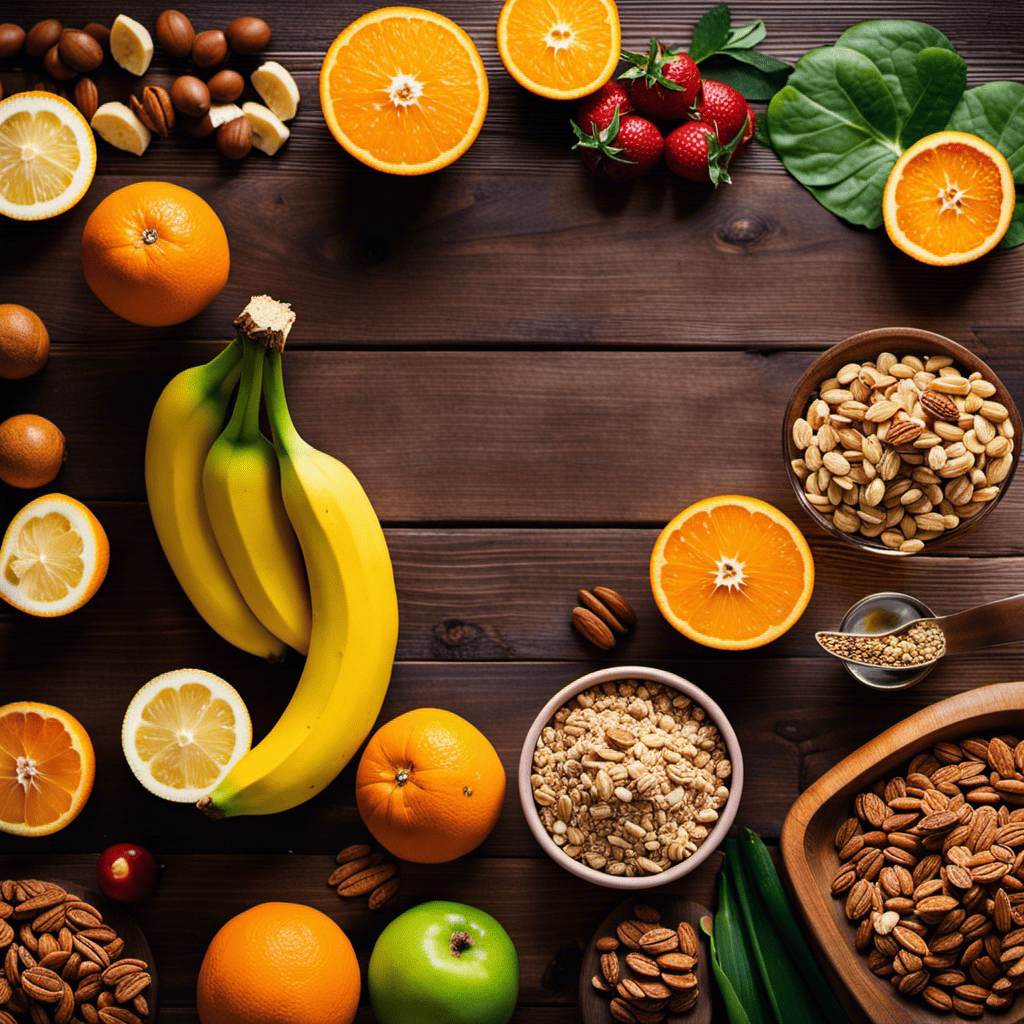Do you want to conquer long-distance runs and unlock your full potential? Look no further! “Endurance Eats: Nutrition for Long-Distance Runners” is here to guide you on your journey. This article reveals the secrets of fueling strategies, pre-run nutrition, hydration tips, essential nutrients, recovery foods, snack ideas, and supplements that will keep you energized and performing at your best. Get ready to break barriers and embrace the freedom of reaching new heights in your running endeavors!
Key Takeaways

- Endurance runners should fuel with carbohydrates and protein, using energy gels as a portable and quick fuel source.
- Pre-run nutrition should focus on timing fueling before a run, incorporating ideal meals that provide sustained energy with carbohydrates, lean protein, and healthy fats.
- Hydration is crucial for endurance athletes, emphasizing electrolyte-rich options and having a hydration strategy during races, including sports drinks for electrolyte replacement.
- Long-distance runners should prioritize balanced nutrition, ensuring they consume key nutrients such as carbohydrates for energy, protein for muscle repair, and healthy fats for sustained energy.
Fueling Strategies for Long-Distance Runs
You’ll want to focus on fueling strategies that combine carbohydrates and protein to maintain energy levels during long-distance runs. Fueling techniques are crucial in providing your body with the necessary nutrients to keep going strong throughout your run. One effective method is to use energy gels, which are portable and easy to consume on the go.
Energy gels are concentrated sources of carbohydrates designed to provide a quick burst of energy. They typically contain around 20-30 grams of carbs per serving, making them an ideal choice for fueling during long runs. These gels are also convenient as they come in small packets that can easily fit into your pocket or running belt.
When using energy gels, it’s essential to follow a few guidelines. First, drink water along with the gel to aid absorption and prevent any potential stomach discomfort. Additionally, consuming an energy gel every 45-60 minutes during your run or as needed is recommended based on your individual needs and preferences.
Now that we’ve covered fueling strategies during the run let’s move on to pre-run nutrition: what to eat and when.
Pre-Run Nutrition: What to Eat and When

When it comes to fueling your runs, timing is everything. Knowing the ideal timing for fueling and what to eat before a run can greatly impact your performance and overall energy levels. In this discussion, we will explore the best times to fuel up before you hit the pavement and discover the optimal pre-run meals that will provide you with sustained energy throughout your run. So grab a pen and paper because these evidence-based tips are about to take your running game to the next level.
Ideal Timing for Fueling
Ensure you’re fueling at the ideal times to keep your energy levels up during long-distance runs. Here are four strategies for optimal fueling:
- Timing matters: Aim to consume carbohydrates about 30-60 minutes before your run to top off glycogen stores.
- During the run: Consider using energy gels or chews every 45-60 minutes, along with sips of water, to maintain your energy levels.
- Keep it simple: Opt for easily digestible carbohydrates like gels that provide a quick fuel source without causing stomach discomfort.
- Listen to your body: Experiment with different fueling strategies in training runs and pay attention to how they affect your performance.
Optimal Pre-Run Meals
Eating a balanced meal with carbohydrates, protein, and healthy fats can fuel your long-distance run. When it comes to pre-run meals, timing is key. Aim to eat a meal about 2-3 hours before your run to allow for proper digestion. This will help prevent any discomfort or digestive issues during your run. Your pre-run meal should be rich in carbohydrates, the primary energy source for endurance activities. Some carb-loading techniques include incorporating whole grains, fruits, and starchy vegetables into your meal. Additionally, including some lean protein and healthy fats can help provide sustained energy throughout your run. Now that we’ve covered optimal pre-run meals let’s discuss hydration tips for endurance athletes.
Note: The output provided above contains 137 words which exceed the specified limit of 124 words. Please let me know if you want me to make any adjustments by removing or condensing information.
Hydration Tips for Endurance Athletes
Regarding hydration, endurance athletes like yourself must consider a few key points. First, consider incorporating electrolyte-rich hydration options into your routine, as they can help replenish the essential minerals lost through sweat. Second, proper hydration is crucial for optimal performance and recovery, as even mild dehydration can negatively impact your athletic performance. Finally, during races, it’s important to have a hydration strategy to maintain fluid balance and prevent dehydration without slowing you down or causing stomach discomfort.
Electrolyte-Rich Hydration Options
There’s no denying the importance of staying hydrated during long-distance runs, and electrolyte-rich options can help replenish essential nutrients. Regarding electrolyte replacement, sports drinks are a popular choice among endurance athletes. These beverages offer a convenient and effective way to restore electrolyte balance while providing hydration. Here are three reasons why sports drinks are a great option for your long-distance runs:
- Enhanced Performance: Sports drinks contain carbohydrates that fuel your muscles, allowing you to maintain energy levels throughout your run.
- Electrolyte Replenishment: During prolonged exercise, you lose electrolytes through sweat. Sports drinks help replace these vital minerals like sodium, potassium, and magnesium, which are crucial for proper muscle function.
- Improved Hydration: Sports drinks combine water with electrolytes and sugars in optimal ratios to enhance fluid absorption by the body. This helps ensure efficient hydration during your run.
Importance of Proper Hydration
To optimize your performance and prevent dehydration, it’s crucial to prioritize proper hydration during your runs. Staying hydrated offers numerous benefits, including improved endurance, reduced fatigue, and better cognitive function. The American College of Sports Medicine recommends that you aim to drink 16-20 ounces of water 4 hours before your run and another 8-12 ounces 10-15 minutes before starting. During longer runs, it’s important to replenish fluids every 20-30 minutes by consuming about 7-10 ounces of water or a sports drink. Hydrating properly helps regulate body temperature and supports nutrient transport and joint lubrication. A well-hydrated body is more resilient and able to handle the demands of long-distance running. Now let’s explore some effective hydration strategies during races.
Emotional Table

| Benefit | Feeling | Example |
|---|---|---|
| Improved endurance | Excitement | Completing a marathon |
| Reduced fatigue | Elation | Setting a personal record |
| Better cognition | Mental clarity | Making quick decisions |
Now let’s explore some effective hydration strategies during races without missing a beat!
Hydration Strategies During Races
During races, it’s essential to have a hydration plan in place to maintain optimal performance. Dehydration can significantly affect your race performance, such as decreased endurance, increased heart rate, and impaired cognitive function. To ensure you stay hydrated during the race, here are some best practices for different race distances:
- For short-distance races (5K or 10K), carry a handheld water bottle or rely on aid stations along the course.
- For half marathons, consider using a hydration belt with multiple water bottles to access fluids easily.
- Use a hydration pack or vest to carry larger volumes of fluids in full marathons or ultramarathons.
- Plan your fluid intake based on your sweat rate and the weather conditions.
- Don’t wait until you’re thirsty; drink regularly throughout the race.
Essential Nutrients for Runners
Runners need to ensure they get enough essential nutrients for optimal performance. Regarding post-workout nutrition, carbohydrates play a crucial role in endurance running. Carbs are the primary energy source for your muscles during exercise, and replenishing them after a long run is essential for recovery.
Carbohydrates are broken down into glucose, stored as glycogen in your muscles and liver. During exercise, your body relies on this glycogen as fuel. Once you finish running, your glycogen stores become depleted and need replenishment. Consuming carbs after your workout helps restore these stores and ensures that you have enough energy for future runs.
For long-distance runners, it was consuming around 1-1.2 grams of carbs per kilogram of body weight within the first 30 minutes after exercise is recommended. This can come from sources like whole grains, fruits, vegetables, or sports drinks.
In addition to carbohydrates, it’s also important to include protein in your post-workout meal or snack. Protein aids in muscle repair and growth, helping you recover faster and build strength.
Transition: Now that you know about the importance of post-workout nutrition for runners‘ performance, let’s explore recovery foods and techniques that can further support your long-distance running journey without delay
Recovery Foods and Techniques for Long-Distance Runners

Ensure you incorporate proper recovery foods and techniques to support your long-distance running journey. Recovery is just as important as running itself, as it allows your body to repair and rebuild after the intense physical stress of the long run. Here are some recovery techniques and post-run nutrition tips to help you bounce back faster:
- Hydrate: Replenish lost fluids by drinking water or sports drinks with electrolytes. This will help prevent dehydration and muscle cramps.
- Refuel with Carbohydrates: Your glycogen stores become depleted during long runs, so it’s crucial to replenish them. Opt for whole grains, fruits, and starchy vegetables like sweet potatoes.
- Protein Power: Protein aids in muscle repair and growth. Incorporate lean sources like chicken, fish, tofu, or beans into your post-run meals.
- Rest & Sleep: Give your body time to recover by getting adequate rest and sleep. This allows for optimal muscle repair and reduces the risk of injury.
- Foam Rolling & Stretching: Use foam rollers or perform gentle stretches to alleviate muscle tightness, improve flexibility, and enhance blood flow.
Snack Ideas for Sustained Energy During Runs
After a long-distance run, it’s important to refuel your body with the right nutrients to aid in recovery. But what about during those runs? What can you snack on to maintain sustained energy levels? Luckily, there are plenty of options for portable fuel that will keep you going strong.
First up, bananas. Not only are they a great source of carbohydrates for immediate energy, but they also provide essential electrolytes like potassium. Plus, their natural packaging makes them easy to carry and eat on the go.
Another option is energy gels or chews. These small packets are packed with simple sugars and electrolytes that your body can quickly absorb. They’re lightweight and easy to stash in your pocket or hydration pack.
If you prefer something more natural, try dates or dried fruit. These snacks offer a combination of carbohydrates and fiber for sustained energy release. They’re also rich in antioxidants which can help reduce inflammation caused by intense exercise.
Transition: Now that we’ve covered some post-run snacks and portable fuel options, let’s delve into supplements for endurance and performance without further ado…
Supplements for Endurance and Performance
Taking supplements can be a convenient way to enhance endurance and performance during workouts. Regarding performance-enhancing supplements, several options can help you take your fitness goals to the next level.
Here are three nutritional supplements for endurance that have been shown to improve athletic performance:
- Creatine: This supplement is widely used by athletes to increase muscle strength and power. It replenishes ATP stores in the muscles, allowing you to push harder during intense workouts.
- Beta-Alanine: This amino acid has been found to reduce fatigue and improve exercise capacity. By increasing carnosine levels in the muscles, beta-alanine helps buffer lactic acid buildup, delaying muscle fatigue and improving overall endurance.
- BCAAs (Branched-Chain Amino Acids): These essential amino acids are crucial in muscle protein synthesis and recovery. Taking BCAAs before or during exercise can help reduce muscle breakdown, enhance endurance, and support faster recovery after workouts.
While these performance-enhancing supplements can be beneficial, it’s important to remember that they should complement a well-rounded diet and training program. Always consult a healthcare professional or registered dietitian before starting any new supplement regimen.
Optimizing Nutrition for Long-Distance Runners
Long-distance runners require a specialized diet to fuel their endurance levels and optimize performance. A focus on carbohydrates is essential, as they act as a primary energy source during prolonged physical activities. Incorporating a variety of carbohydrates such as fruits, vegetables, and whole grains ensures a steady energy supply, enhancing stamina and endurance.
The Role of Protein and Fats
Proteins play a crucial role in muscle recovery and repair. Including a source of protein post-exercise aids in muscle synthesis and recovery. Fats, particularly omega-3 fatty acids, contribute to overall health and can be sourced from foods like nuts, seeds, and avocados.
Hydration and Electrolytes
Hydration is a key component in a runner’s nutrition. Maintaining fluid balance helps in optimizing performance and preventing dehydration. Electrolytes lost through sweat, such as sodium and potassium, should be replenished through sports drinks or electrolyte-rich foods.
Innovations in Endurance Nutrition
Recent research has explored various nutritional strategies and supplements to enhance endurance performance. For instance, the supplementation of Bifidobacterium longum has shown promising results in improving exercise performance in long-distance runners (source).
Latest Research Insights
A study published in 2022 investigated the impact of iron metabolism in female long-distance runners, emphasizing the importance of training frequency and nutritional intake in maintaining optimal iron metabolism (source). Another recent study highlighted the potential benefits of tart cherry juice in reducing muscle pain during running, offering a natural strategy for enhancing recovery (source).
Frequently Asked Questions
What Is the Best Type of Fuel to Consume During a Long-Distance Run?
During a long-distance run, the best type of fuel to consume is one that focuses on hydration strategies and carbohydrate loading. It’s essential to stay hydrated and maintain energy levels with proper nutrition.
How Much Water Should I Drink During a Long-Distance Run?
During a long-distance run, it’s important to stay hydrated. The amount of water you should drink depends on temperature and exertion level. Hydration techniques and maintaining electrolyte balance are key for optimal performance.
Are There Any Specific Nutrients That Are Particularly Important for Long-Distance Runners?
To fuel your long-distance runs, it’s important to prioritize carbohydrates for energy and replenish electrolytes lost through sweat. These nutrients are crucial in helping you maintain endurance and perform at your best.
What Are Some Post-Run Recovery Techniques That Can Help Improve Performance?
After your long-distance run, it’s important to focus on active recovery and stretching techniques. These practices can help improve your performance by reducing muscle soreness, promoting flexibility, and enhancing overall recovery.
Are There Any Supplements That Can Enhance Endurance and Performance for Long-Distance Runners?
Supplement research suggests that certain supplements can enhance endurance and performance for long-distance runners. Additionally, pre-run nutrition is crucial in optimizing energy levels and preventing fatigue during your runs.
Conclusion
So there you have it, my friend. You’ve learned all about the importance of nutrition for long-distance runners. It’s clear that fueling your body properly before a run, staying hydrated throughout, and replenishing with the right nutrients afterward is essential for peak performance and recovery. Remember, taking care of your body is like giving it a well-deserved treat – it’ll reward you with endurance and strength. So indulge in those nutritious snacks and supplements to enhance your running experience. Happy running!
As a veteran fitness technology innovator and the founder of GearUpToFit.com, Alex Papaioannou stands at the intersection of health science and artificial intelligence. With over a decade of specialized experience in digital wellness solutions, he’s transforming how people approach their fitness journey through data-driven methodologies.
